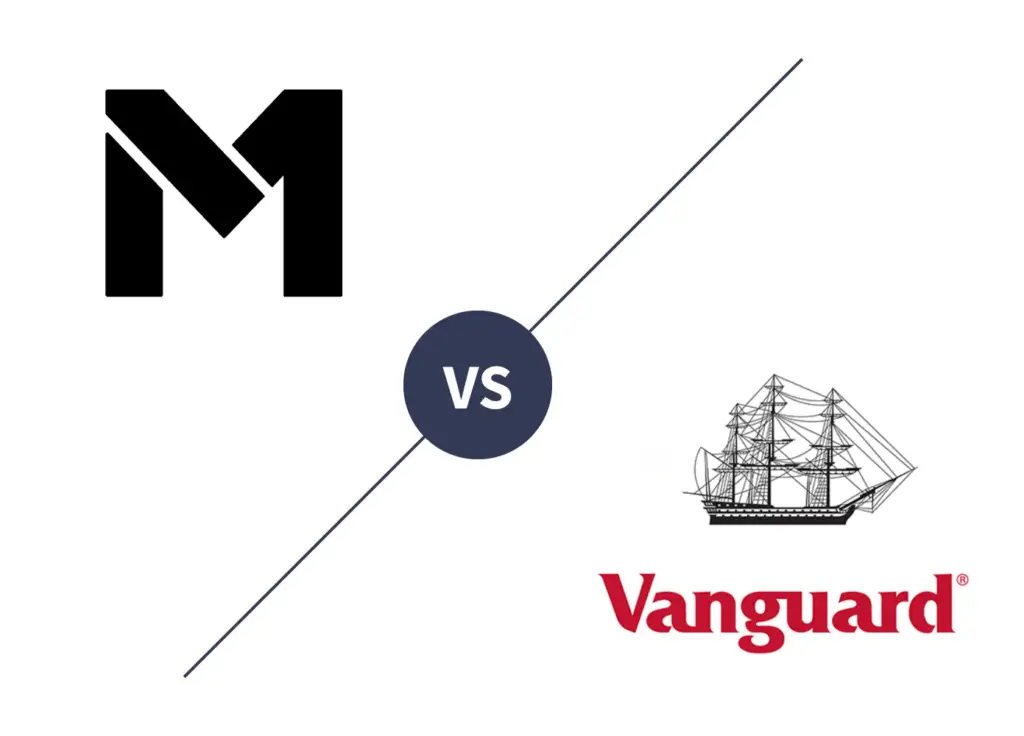
Financially reviewed by Patrick Flood, CFA.
With investors waking up to brokerage commissions and unnecessary fees, low-cost brokers like M1 Finance and Vanguard are soaring in popularity. Here we'll compare the two. I wrote a separate comprehensive review of M1 Finance here if you're interested in that.
Disclosure: Some of the links on this page are referral links. At no additional cost to you, if you choose to make a purchase or sign up for a service after clicking through those links, I may receive a small commission. This allows me to continue producing high-quality content on this site and pays for the occasional cup of coffee. I have first-hand experience with every product or service I recommend, and I recommend them because I genuinely believe they are useful, not because of the commission I may get. Read more here.
M1 Finance vs. Vanguard – Summary Comparison
Contents
M1 Finance vs. Vanguard – Commissions and Fees
Both M1 Finance and Vanguard offer commission-free trades and zero account fees, aside from miscellaneous fees for things like paper statements, outbound account transfers, inactivity, etc.
Vanguard just recently announced commission-free trades in January 2020. Low-cost Vanguard ETF's are available on M1 Finance, but mutual funds are not.
Vanguard does still have a $1 fee for options contracts.
M1 Finance vs. Vanguard – Account Types
M1 Finance offers taxable, joint, Traditional IRA, Roth IRA, Rollover IRA, SEP IRA, Trust, and Custodial accounts. They currently do not offer SIMPLE IRA, 401(k), Solo 401(k), 529, HSA, or Non-Profit accounts.
Vanguard offers all of M1's account types plus Solo 401(k), SIMPLE IRA, and 529.
If you need any of the latter, Vanguard would be the better choice.
M1 Finance vs. Vanguard – Investment Products
M1 Finance offers most ETF's and individual stocks. Luckily, you can access Vanguard's low-cost ETF's through M1.
Vanguard offers ETF's, individual stocks, mutual funds, and options contracts. I should note here that Vanguard does not allow you to buy leveraged ETF products, such as for the popular Hedgefundie strategy. This may or may not be a concern to you.
At this time, neither broker offers futures, forex, and crypto. They are not built for day trading.
M1 Finance vs. Vanguard – Customer Service
I've personally had no issues with M1's customer service, but I've seen some anecdotes of people saying it can be slow. That said, I also haven't really had the need for customer service from M1.
Consistent with John Bogle's vision, Vanguard was famous for their stellar customer service early on, but the firm's success seems to be its own undoing in recent years. Rapid customer growth and huge fund inflows have resulted in increasing complaints and worsening sentiment over Vanguard's customer service in recent years, as well as technical issues arising from the sheer load on Vanguard's infrastructure.
M1 Finance vs. Vanguard – Margin
Margin is a collateralized loan on your investment portfolio that allows you to buy more investments, thereby leveraging your portfolio (or using that loan to refinance higher interest rate debt or whatever you want).
M1 Finance clearly wins on its margin offering and rates. M1's rate is typically about 5% lower than Vanguard's.
Remember that margin is an additional risk, including the risk of losing more than you invest. Margin is not available for retirement or custodial accounts. Rates may vary.
M1 Finance vs. Vanguard – Mobile App
M1 Finance has a sleek, intuitive, robust mobile app for both Apple iOS and Android. I find it very user-friendly. Here are some screenshots of the M1 app:
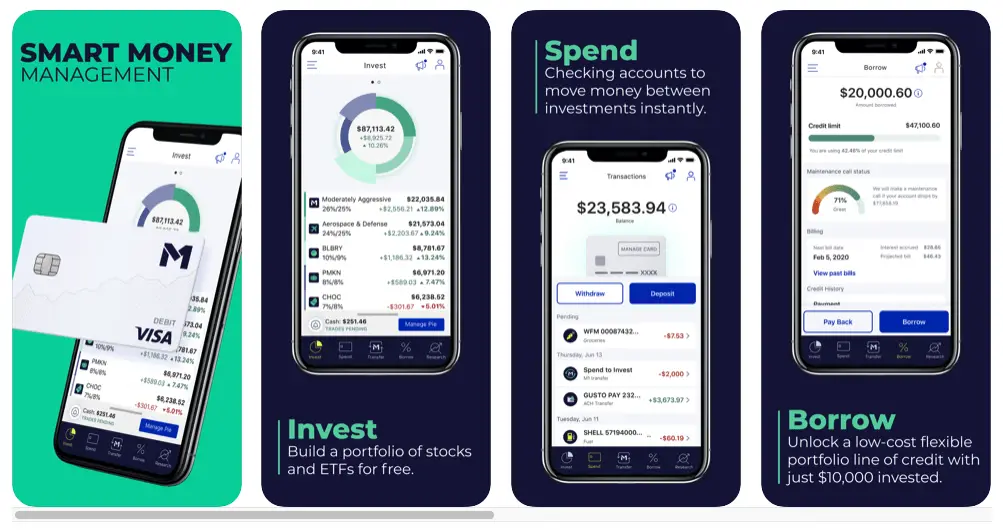
Vanguard has worked on improving their mobile app recently, but their Android app specifically is notoriously bad. Users surmise that Vanguard doesn't care to support and update the Android app. Here are some screenshots of the Vanguard app:
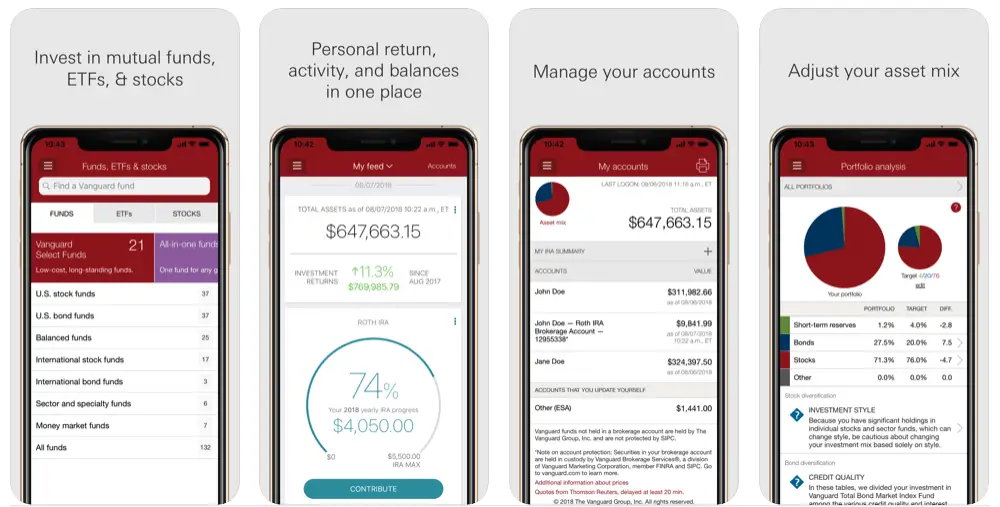
M1 Finance vs. Vanguard – Interface/Usability
The Vanguard interface is a little antiquated. It may be a little more confusing for a beginner investor. Their user interface looks like this:
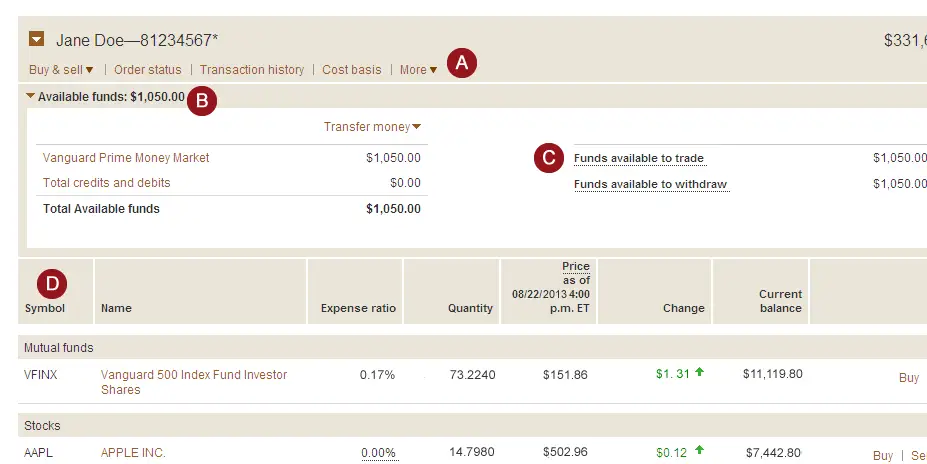
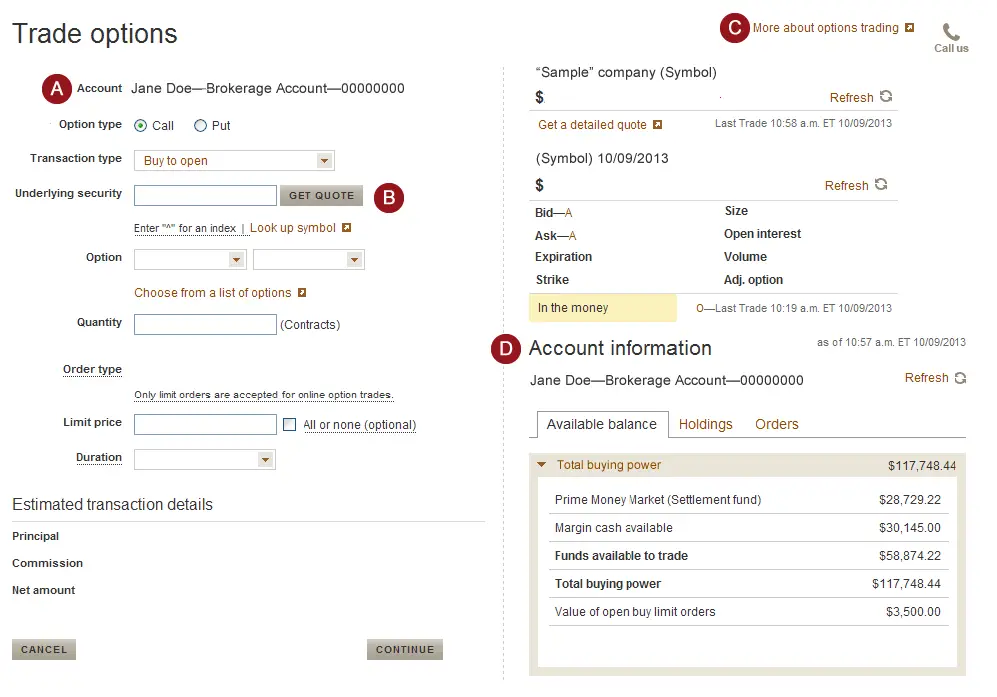
The interface for M1 Finance, on the other hand, is sleek, modern, extremely simple, and intuitive with its pie-based visualization. It is perfect for beginner and seasoned investors alike:
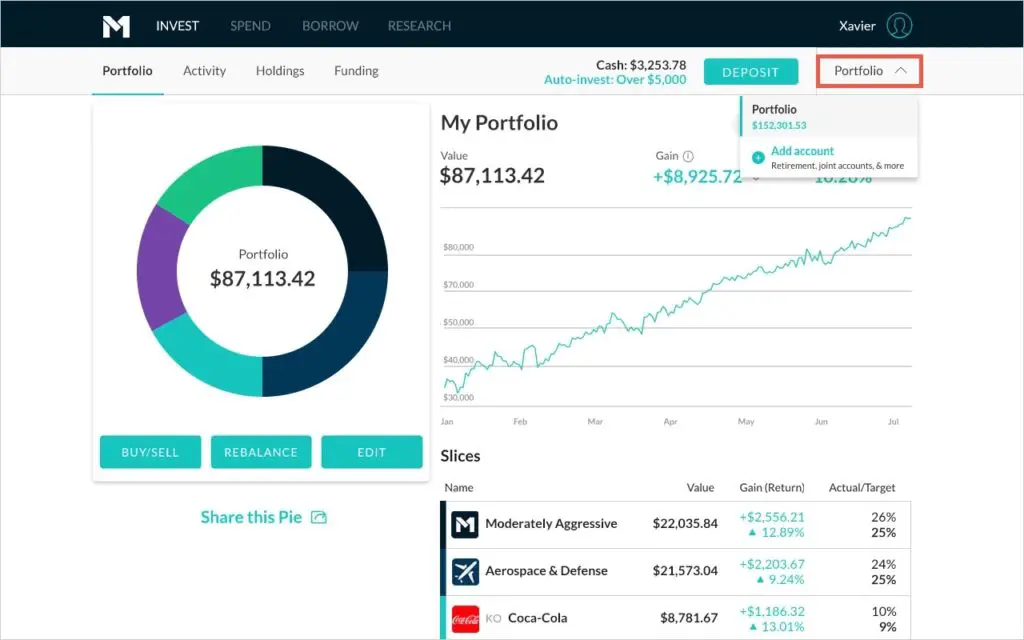
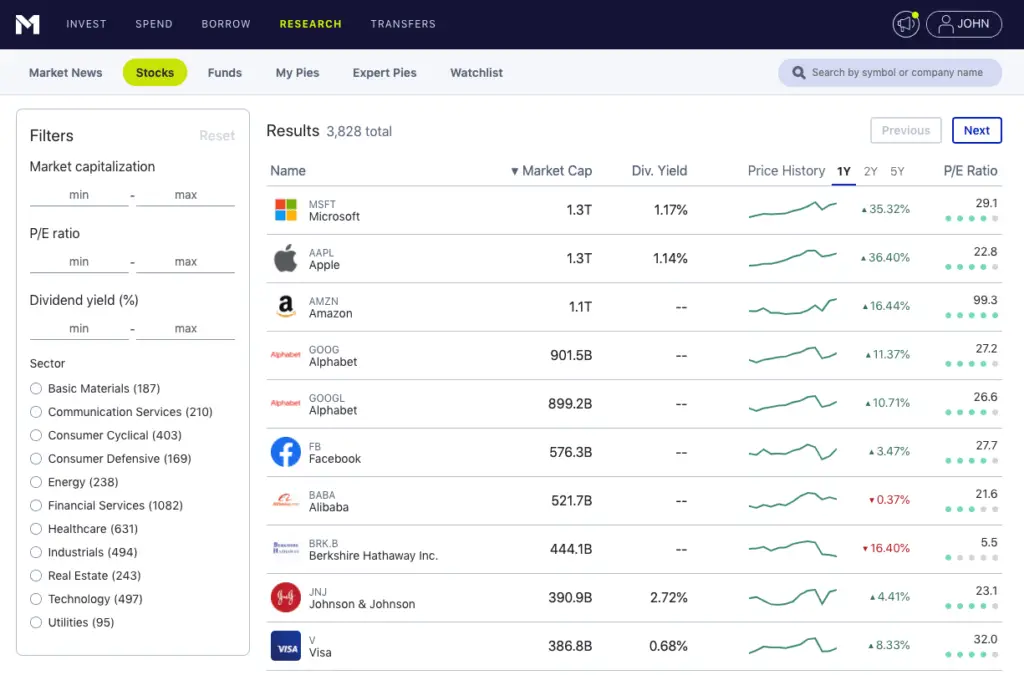
M1 Finance vs. Vanguard – Extra Features
Let's look at the differences between M1 Finance and Vanguard for a few specific features.
Checking and Money Market Accounts
Vanguard doesn't provide access to an integrable FDIC-insured high-yield cash account like you can get with M1 Finance via M1 Earn. On the flip side, Vanguard offers a money market fund that you can't get with M1 Finance.
Research Tools
Neither M1 Finance nor Vanguard offer robust charting and analysis tools. Research tools from both are pretty basic – stock and ETF screeners, technical indicators, etc. Again, neither platform is built for day trading.
Expert Advice
Vanguard offers their Personal Advisor Services if your account value is over $500,000 for a fee of 0.30% of your invested balance. M1 Finance's “Model Portfolios” are available to everyone at any time. You can also use M1 to invest in a “lazy portfolio” and have it rebalance automatically.
Automatic Rebalancing
Vanguard also doesn't employ M1's famous “dynamic rebalancing,” which strategically allocates new deposits to maintain your portfolio's target allocations. For example, if your portfolio has a 60/40 ratio of stocks to bonds and after 6 months your stocks position has performed worse than the bonds side, your allocation may have drifted to 50/50, requiring you to manually rebalance to get back to 60/40 with a traditional broker like Vanguard. M1 Finance does this for you, directing new deposits where necessary to keep your target allocation on track.
Fractional Shares
Vanguard also doesn't offer fractional shares for stocks and ETF's like M1 Finance does. Fractional shares are a feature that allows every penny to work for you. For example, if Apple stock has a price of $300 per share but you only have $100, you can't buy any Apple with a traditional broker like Vanguard. With M1 Finance, you are still able to buy a fraction of that $300 share. Specifically, in this case, your $100 buys you precisely 1/3 of a share of Apple stock. This is especially powerful for investors who still want a diversified stock portfolio but don't have much capital to invest. This also prevents cash from unnecessarily sitting idly in your account uninvested. Vanguard does offer fractional shares for mutual funds.
Order Control and Trading Window
Vanguard has the typical order control and all-day trading window that you'd expect from a traditional broker. M1 Finance, which is built for passive, long-term, buy-and-hold investing, does not offer dedicated order control and only uses two trading windows per day.
M1 Finance vs. Vanguard – Summary and Conclusion
- Both M1 Finance and Vanguard offer zero-commission trades and low or zero fees.
- Vanguard has a few more account types than M1 Finance, notably Solo 401(k), SIMPLE IRA, and 529.
- M1 Finance offers most ETF's and individual stocks. Vanguard offers ETF's, individual stocks, their own mutual funds, and options contracts.
- Judging by the amount of complaints over Vanguard's customer service in recent years, I'd argue customer service should be better with M1.
- M1 Finance offers much lower margin rates than Vanguard, and M1's margin loan can be used for anything you want.
- Vanguard has a slightly more clunky, confusing user interface that would be more suitable for seasoned investors and traders. M1 Finance has a beautifully simple and intuitive interface.
- Both M1 and Vanguard have no minimum deposit requirement. Vanguard's mutual funds require a $3,000 minimum investment.
- M1 Finance offers a few extra goodies that Vanguard doesn't have: an optional integrable checking account and debit card, dynamic rebalancing, and fractional shares.
- Vanguard has the typical order control and all-day trading window that you'd expect. M1 does not offer dedicated order control and only uses one trading window per day.
- M1 is also probably better if you want to implement a “lazy portfolio” and have it rebalance automatically.
I think M1 Finance slightly edges out over Vanguard for the average retail investor due to the reasons above. M1 Finance is great for both beginner and seasoned long-term investors who want full portfolio customization, a modern, intuitive interface and mobile app, access to cheap margin, an optional integrable checking account, fractional shares, and dynamic rebalancing. M1 is not a good choice for those who need order control and, like Vanguard, is not designed for day traders.
If you definitely need access to mutual funds, options contracts, and order control, or want i401(k), SIMPLE IRA, or 529 accounts, go with Vanguard.
I've actually talked to people who utilize both – Vanguard for their set-and-forget retirement accounts in mutual funds, and M1 for a taxable account to access extremely cheap margin. Vanguard is also one of the brokerages that M1 Finance sees transfers from most often:
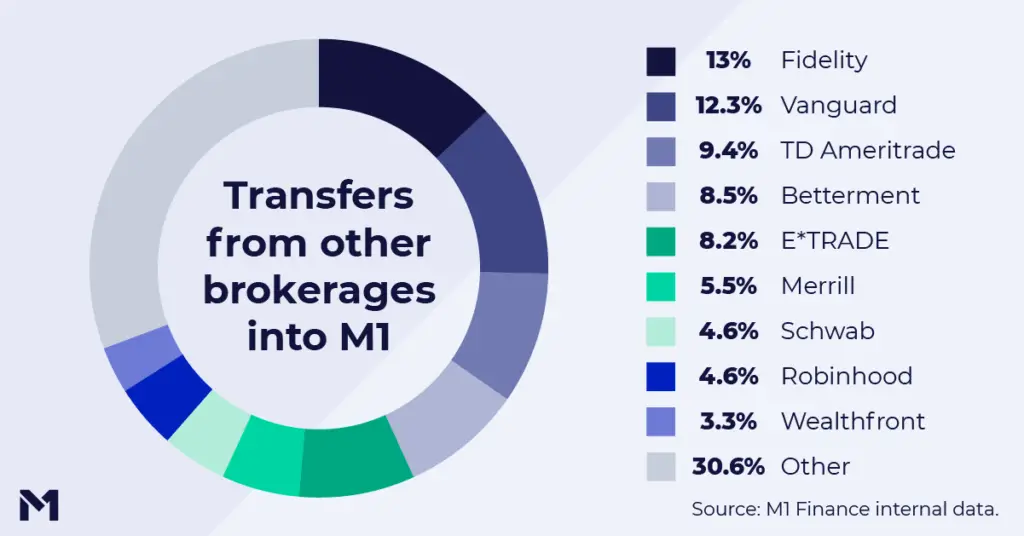
Right now M1 is offering a transfer promotion of a 0.50% payout on settled transfers over $10,000 into Invest accounts before January 31 with a max payout of $25,000. Terms for this promotion are here.
Disclaimer: While I love diving into investing-related data and playing around with backtests, this is not financial advice, investing advice, or tax advice. The information on this website is for informational, educational, and entertainment purposes only. Investment products discussed (ETFs, mutual funds, etc.) are for illustrative purposes only. It is not a research report. It is not a recommendation to buy, sell, or otherwise transact in any of the products mentioned. I always attempt to ensure the accuracy of information presented but that accuracy cannot be guaranteed. Do your own due diligence. I mention M1 Finance a lot around here. M1 does not provide investment advice, and this is not an offer or solicitation of an offer, or advice to buy or sell any security, and you are encouraged to consult your personal investment, legal, and tax advisors. Hypothetical examples used, such as historical backtests, do not reflect any specific investments, are for illustrative purposes only, and should not be considered an offer to buy or sell any products. All investing involves risk, including the risk of losing the money you invest. Past performance does not guarantee future results. Opinions are my own and do not represent those of other parties mentioned. Read my lengthier disclaimer here.

Are you nearing or in retirement? Use my link here to get a free holistic financial plan and to take advantage of 25% exclusive savings on financial planning and wealth management services from fiduciary advisors at Retirable to manage your savings, spend smarter, and navigate key decisions.

I don’t care how antiquated Vanguard’s website is, I want to stay there because eventually I may use Vanguard’s trust administration services, but I am totally jealous of M1 Finance’s rebalancing tools! It would save me such a headache. Come on, Vanguard, do this!